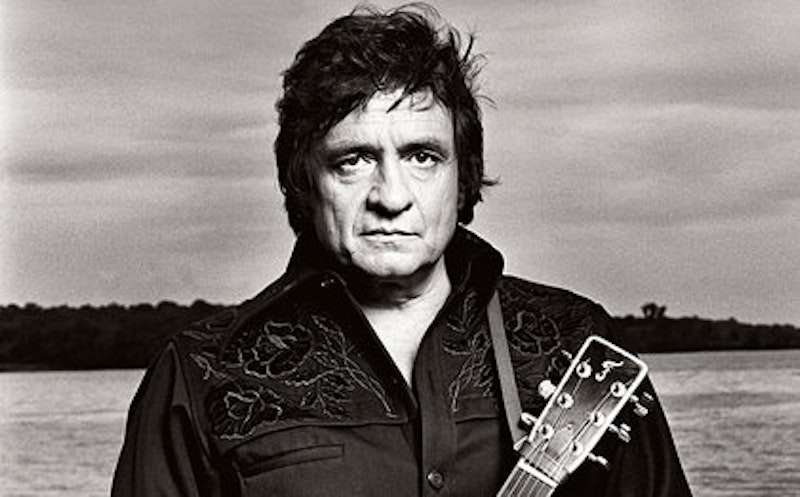One of Johnny Cash's lost albums from the 1980s was released earlier this year—and it wasn't all that good. This fits with the general narrative about Cash's career. Supposedly, during the 80s he was at a creative nadir; his longtime label, Columbia, dropped him, his songs did nothing commercially—he was going nowhere. Until, that is, Rick Rubin scooped him up, slapped some bleak cover art on him, and turned Cash back into a vital creative force and cultural hero once again.
That account of things isn't entirely wrong; Cash did struggle in the 80s, and Rubin did revitalize his career. But that was more a matter of marketing than aesthetics. Because Cash never stopped making good music, though much of it was off to the side, sometimes in unexpected venues. Here then are some of Cash's greatest recordings between 1980 and 1989:
Emmylou Harris (w/Johnny Cash and Ricky Skaggs), 1980
This wonderful gospel performance was recorded for Harris' Roses in the Snow, her bluegrass-tinged high-water mark, and one of the seminal documents of the New Traditionalist movement. Twenty-five odd years into his career and Cash was still cutting edge.
Johnny Cash and Levon Helm, "The Death of Me" 1980
This is from The Legend of Jesse James, a concept album focused on the songs of Paul Kennerley. Cash performed the part of Frank James; Helm got to be Jesse. The music has a nice easy lope that approximates without copying Johnny's the roll of his early Sun sides.
Marty Stuart and Johnny Cash, "One More Ride," 1982
From Stuart's wonderful, almost completely ignored sophomore album, Busy Bee Café. Stuart was a longtime Cash sideman, and the two sound like they're having a lovely time on this old Bob Nolan cowboy tune, harmonizing above Stuart's deft bluegrass picking.
Rosanne Cash w/ Johnny Cash, "That's How I Got to Memphis," 1982
Johnny's daughter Rosanne was a much bigger force on country radio in the 80s than he was. This is from her album Somewhere in the Stars. For the most part it's a standard Rosanne song, riding that line just right between easy listening and country. Dad just shows up for the last chorus, lending a helping hand to lift the tune from good to sublime.
Johnny Cash and June Carter Cash, "Brand New Dance" 1983
Even on his weakest albums, Cash's duets with June are always a highlight. This is another Paul Kennerley tune, recorded for the album Johnny 99.
Johnny Cash. "Hey Hey Train," 1985
Cash sang train songs throughout his career, but this is one of the best, a blistering, Marty Stuart penned number from The Baron, Cash's second to last album for Columbia.
The Highwaymen (Johnny Cash and Willie Nelson), "The Twentieth Century Is Almost Over"
The Highwaymen supergroup albums (with Johnny Cash, Willie Nelson, Waylon Jennings, and Kris Kristofferson) are a mixed bag overall. I love this Cash/Wilson duet though, cheesy keyboards and all. The song lyrics work well in the decadent setting, and the singers both sound like they're having a ball, with Nelson swinging around the beat and Cash thumping down with winking obliviousness.
Johnny Cash, "I'd Rather Have You," 1987
After getting dumped by Columbia, Cash moved to Mercury—an almost unknown portion of his career, including a treasure trove of great performances, many of them produced by longtime Cash collaborator Jack Clement. "I'd Rather Have You" is a gorgeously hokey love song from his first album for the label, Johnny Cash Is Coming To Town.
Johnny Cash, Everly Brothers, Rosanne Cash, "Ballad of a Teenage Queen"
This is a remake of one of Cash's Sun singles, with the Everly Brothers replacing the barbershop quartet and Rosanne Cash replacing the soprano. It's by far the superior version; sometimes it can take 30 years to get a tune right.
Johnny Cash, Earl Scruggs, Carter Family, Nitty Gritty Dirt Band, "Life's Railway to Heaven," 1989
From the Nitty Gritty Dirt Band's album Will the Circle Be Unbroken 2, Cash sings gospel backed by Scruggs on banjo and the harmonies of the Carter Family, Helen, June and Anita. If you can find a copy of the great Carter Family album from the same year, Wildwood Flower, to which Cash contributed some backing vocals, grab it; it's essential, and almost completely impossible to get a hold of.
—Follow Noah Berlatsky on Twitter: @hoodedu

